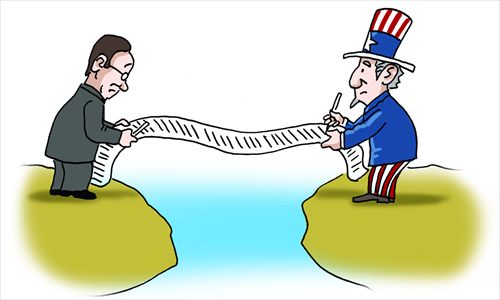China, US face divergences via S&ED

Illustration: Liu Rui/GT
Some people see the China-US Strategic and Economic Dialogue (S&ED) as no more than a matter of routine, during which cabinet-level officials from both sides get together and mouth some platitudes. Some scholars from the US have even called for an end to this mechanism. But this view cannot be more wrong, for it ignores the irreplaceable role that the S&ED has played in mitigating tensions. And the dialogue aims exactly at shattering such malicious attitudes toward the Sino-US relationship.
The seventh round of the S&ED begun under the shadow of rising disputes over the South China Sea and cyber security. Not long ago, there were concerns about whether warships and fighter jets from two sides might head toward a face-off or a collision in the South China Sea, which would lead to an all-out war. Nevertheless, when policymakers think of the fact that they are about to spend a few days together, they have every reason to find ways to control divergences and avoid miscalculations. The S&ED therefore turned out to be a stop-loss tool for the relationship between Beijing and Washington.
A new characteristic of the bilateral relationship is taking shape nowadays - both countries are more willing to openly discuss existing divergences. As Chinese Vice Premier Wang Yang wrote in an article published in The Wall Street Journal before the S&ED kicked off in Washington, "maintaining a strategic dialogue has helped the US and China effectively manage differences and minimize their impact on our relationship … The convergence of interests has gone beyond many people's imagination. It is now such that neither could afford noncooperation or confrontation."
Over the past nine years, bilateral trade has doubled, and China has become one of the fastest-growing export markets for the US. Direct investment from Chinese enterprises to the US has grown fivefold over the last six years, which created more than 80,000 jobs across the country. According to a report released by the Rhodium Group in May, Chinese investment to the US will rise to between $100 billion and $200 billion by 2020, creating 200,000 to 400,000 jobs.
The improving economic and people-to-people exchanges are not a guarantee of long-term peace between China and the US. For example, the economic interdependence between Germany and Britain did not stop them from plunging into war in the early 20th century. This is what the S&ED is trying to find a solution to. It combines subjects of discussion on strategic and economic matters together, which motivated senior officials from both sides to realize the significance of maintaining cooperative engagement via more comprehensive and insightful means.
The S&ED has played an important role for both China and the US in directly promoting coordination in international affairs, such as the North Korea and Iran nuclear issues, and the Afghan peace process. More importantly, Sino-US military-to-military ties have benefited from it too. The two nations are holding negotiations over the establishment of more "rules of the road" for the future accidental engagement at sea or in the air.
It is not fair to turn a blind eye to all these achievements brought by the S&ED. There are even several US scholars who absurdly raised the idea that the White House's policy toward China will change from "engagement" to "containment." Think about it, the US cannot even claim victory in the wars in Iraq or Afghanistan, or defeat terrorist organizations like the Islamic State. Hence, if it chooses to confront China, its efforts will be doomed to be self-defeating.
On the other hand, China has actually quite a few measures to counter the US, but Beijing has spared no effort to establish a new type of major power relations with Washington. This is because Beijing firmly believes that rivalry goes against the interests of people from both sides.
The US should respond positively to China's goodwill, and this is not doing a favor for China, but for itself. Just as US Vice President Joe Biden said during the opening speech at this round of the S&ED, "A rising China can be a significant asset for the region and the world, and selfishly, for the US."
The author is a research fellow with the Charhar Institute and an adjunct fellow with the Center for International and Strategic Studies, Peking University. opinion@globaltimes.com.cn